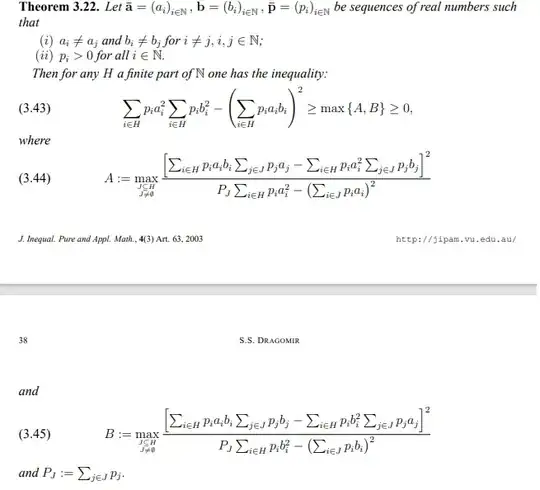My previous answer established that $\sum_{1\leq i<j\leq n}{|x_{i}-x_{j}||y_{i}-y_{j}|} \le n $. Here is an improvement where I can show that $\sum_{1\leq i<j\leq n}{|x_{i}-x_{j}||y_{i}-y_{j}|} \le n -\frac14 $.
Note that
$$
2 \sum_{1\leq i<j\leq n}{|x_{i}-x_{j}||y_{i}-y_{j}|} \\
= \sum_{1\leq i\leq n}\sum_{1\leq j\leq n}{|x_{i}-x_{j}||y_{i}-y_{j}|}
$$
Now we use an estimate for the individual terms. By the first condition we have that
$
1 = \sum_{1\leq i\leq n}{x_{i}^2 }
$
and hence, for a pair (i,j) with $i \ne j$, we have $
x_i^2 + x_j ^2 \le 1
$. This gives, by Cauchy-Schwartz, that
$$
|x_{i}-x_{j}| \le |x_{i}|+ |x_{j}| \le \sqrt 2 \cdot \sqrt{x_i^2 + x_j ^2 } \le \sqrt 2
$$
Now look at an individual term in the original inequality. Denote $ a= |x_{i}-x_{j}|$ and $ b = |y_{i}-y_{j}|$ where $0 \le a,b \le \sqrt 2$. Observe the following equality:
$$
ab = \frac12 (a^2 + b^2) - \frac{(a^2 - b^2)^2}{2(a+b)^2}
$$
Applying this term-wise to the original inequality gives
$$
\sum_{1\leq i\leq n}\sum_{1\leq j\leq n}{|x_{i}-x_{j}||y_{i}-y_{j}|} \\
= \frac12 \sum_{1\leq i\leq n}\sum_{1\leq j\leq n} (x_{i}-x_{j})^2 + \frac12 \sum_{1\leq i\leq n}\sum_{1\leq j\leq n} (y_{i}-y_{j})^2 \\
\qquad - \frac{1}{2} \sum_{1\leq i\leq n}\sum_{1\leq j\leq n} \frac{((x_{i}-x_{j})^2 - (y_{i}-y_{j})^2)^2 }{(|x_{i}-x_{j}|+|y_{i}-y_{j}|)^2}
$$
For the last term we can apply Cauchy-Schwartz in the form
$$
\sum_k \frac{(a_k^2 - b_k^2)^2}{(a_k+b_k)^2} \ge \frac{\left[\sum_k (a_k^2 - b_k^2)^2\right]^2}{\sum_k(a_k+b_k)^2(a_k^2 - b_k^2)^2}
$$
Since further $a_k,b_k \le \sqrt 2$, we have $(a_k+b_k)^2 \le 8$. Note that this is a very crude approximation. Refining this approximation in either of the denominators could obviously lead to better overall results, however I didn't succeed here.
We obtain
$
\sum_k \frac{(a_k^2 - b_k^2)^2}{(a_k+b_k)^2} \ge \frac18 \sum_k(a_k^2 - b_k^2)^2
$.
This gives that
$$
\sum_{1\leq i\leq n}\sum_{1\leq j\leq n}{|x_{i}-x_{j}||y_{i}-y_{j}|} \\
\le \frac12 \sum_{1\leq i\leq n}\sum_{1\leq j\leq n} (x_{i}-x_{j})^2 + \frac12 \sum_{1\leq i\leq n}\sum_{1\leq j\leq n} (y_{i}-y_{j})^2 \\
\qquad - \frac{1}{16} \sum_{1\leq i\leq n}\sum_{1\leq j\leq n} ((x_{i}-x_{j})^2 - (y_{i}-y_{j})^2)^2
$$
We can now evaluate these sums separately, and here and in the following make use of index re-assignment $(i \leftrightarrow j)$ where appropriate. The first sum gives
$$
\frac12 \sum_{1\leq i\leq n}\sum_{1\leq j\leq n} (x_{i}-x_{j})^2 \\
= \frac12 \sum_{1\leq i\leq n}\sum_{1\leq j\leq n} (x_{i}^2 + x_{j}^2) -
\sum_{1\leq i\leq n}\sum_{1\leq j\leq n} x_{i}x_{j}\\
= n \sum_{1\leq i\leq n} x_{i}^2 - (\sum_{1\leq i\leq n} x_{i})^2 = n
$$
where the conditions of the original task were used. The same result holds for the second sum. The third sum demands again opening the brackets. Let us define $S$ by
$$
S= \sum_{1\leq i\leq n}\sum_{1\leq j\leq n} \left[((x_{i}-x_{j})^2 - (y_{i}-y_{j})^2)^2 \right]\\
= \sum_{1\leq i\leq n}\sum_{1\leq j\leq n} (x_{i}-x_{j})^4 + \sum_{1\leq i\leq n}\sum_{1\leq j\leq n} (y_{i}-y_{j})^4 - 2\sum_{1\leq i\leq n}\sum_{1\leq j\leq n} (x_{i}-x_{j})^2 (y_{i}-y_{j})^2
$$
Let us look at the three sums separately:
$$
\sum_{1\leq i\leq n}\sum_{1\leq j\leq n} (x_{i}-x_{j})^4 \\
= \sum_{1\leq i\leq n}\sum_{1\leq j\leq n} (x_{i}^4 - 4 x_ix_j^3 + 6 x_i^2x_j^2 - 4 x_i^3x_j + x_{j}^4)\\
= 2 n \sum_{1\leq i\leq n} x_{i}^4 - 8 \sum_{1\leq i\leq n}x_i\sum_{1\leq j\leq n} x_j^3 + 6 \sum_{1\leq i\leq n}x_i^2\sum_{1\leq j\leq n} x_j^2\\
= 2 n \sum_{1\leq i\leq n} x_{i}^4 + 6
$$
since the middle terms disappear by the third condition in the orginal task. Likewise
$$
\sum_{1\leq i\leq n}\sum_{1\leq j\leq n} (y_{i}-y_{j})^4 = 2 n \sum_{1\leq i\leq n} y_{i}^4 + 6
$$
The third sum gives
$$
2 \sum_{1\leq i\leq n}\sum_{1\leq j\leq n} (x_{i}-x_{j})^2 (y_{i}-y_{j})^2 \\
= 4 n \sum_{1\leq i\leq n} x_{i}^2 y_i^2 + 4 \sum_{1\leq i\leq n}x_i^2\sum_{1\leq j\leq n} y_j^2 -8 \sum_{1\leq i\leq n}\sum_{1\leq j\leq n} \left[ 2 x_ix_jy_j^2 + 2 y_iy_jx_j^2 - 2 x_ix_jy_iy_j\right]\\
= 4 n \sum_{1\leq i\leq n} x_{i}^2 y_i^2 + 4 -16 \sum_{1\leq i\leq n}x_i\sum_{1\leq j\leq n}x_jy_j^2 -16 \sum_{1\leq i\leq n}y_i\sum_{1\leq j\leq n}y_jx_j^2 + 16 \sum_{1\leq i\leq n}x_iy_i\sum_{1\leq j\leq n}x_jy_j\\
= 4 n \sum_{1\leq i\leq n} x_{i}^2 y_i^2 + 4
$$
since the last three terms disappear by the second and third condition in the orginal task. This second condition (orthogonality) was used here for the first time.
Collecting these results gives
$$
S = 8 + 2 n \sum_{1\leq i\leq n} (x_{i}^2- y_i^2)^2
$$
Now we have that
$$
\sum_{1\leq i\leq n}\sum_{1\leq j\leq n}{|x_{i}-x_{j}||y_{i}-y_{j}|}
\le 2n - \frac{1}{16} S \\
= 2n - \frac12 - \frac{n}8 \sum_{1\leq i\leq n} (x_{i}^2- y_i^2)^2
\le 2n - \frac12
$$
and hence, considering the original inequality, we have that
$$
\sum_{1\leq i<j\leq n}{|x_{i}-x_{j}||y_{i}-y_{j}|} \le n - \frac14
$$
